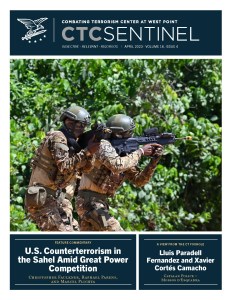From the Editor
The late General Wayne A. Downing, a former distinguished chair of the Combating Terrorism Center at West Point, used to tell his colleagues at the Center, “Who thinks wins.” In this month’s feature article, Christopher Faulkner, Raphael Parens, and Marcel Plichta argue that smarter counterterrorism in the Sahel, and across sub-Saharan Africa, can pay big dividends for the United States on the field of great power competition. They write that “the United States is at a critical juncture as it looks to adapt its counterterrorism mission. Nowhere is this more evident than in the Sahel region of Africa, where for the past decade, the United States has relied on France to serve as the counterterrorism lead. Those days are over, at least for now, and the United States is left attempting to balance its counterterrorism efforts in the frame of great power competition. However, too often these two strategic objectives are cast as zero-sum. In reality, U.S. counterterrorism in the Sahel, if appropriately reassessed, designed, and implemented, can generate real wins for the United States as it seeks to counter Russian and Chinese influence in the region. Additionally, and most importantly, it can improve the prospects for stability and security for African states in desperate need of both.”
Our interview is with two counterterrorism officials at the Catalan Police – Mossos d’Esquadra: Inspector Lluis Paradell Fernandez, head of the Central Analysis Unit, Intelligence and Counterterrorism Service, and Deputy Inspector Xavier Cortés Camacho, head of the Counterterrorism Central Area. They discuss lessons learned as a result of the 2017 Islamic State-inspired attacks in Barcelona and Cambrils, the evolving threats Catalonia faces, and the importance of “a joined-up effort in working to prevent violent extremism.”
Lucas Webber and Daniele Garofalo write that “the Islamic State’s leadership and central propaganda apparatus have been pushing to boost the Somalia branch’s profile, while pro-Islamic State-Somalia groups have been producing media content to help the movement’s message reach Somali, Amharic, Oromo, and Swahili speakers to boost fundraising, recruitment, and violent incitement efforts as well as to grow grassroot support in regions populated by these ethnolinguistic communities.” They argue that “these developments could have regional security implications if the Islamic State is able to strengthen the Somalia branch using these means. Bolstered transnational connections could enable violent incitement and attacks directed into neighboring countries.” Nodirbek Soliev examines digital terror financing by central Asian jihadis. He writes that “their online financing efforts tend to involve three stages. The first is the dissemination of fundraising propaganda and contacting prospective donors via online public accounts. The second is communication via encrypted messaging apps to identify a suitable mode of transaction and to provide security protocols. The third is the transaction itself. Understanding these mechanisms can help enhance relevant countries’ response strategies against terrorism financing risks.”
Paul Cruickshank, Editor in Chief
 Skip to content
Skip to content

